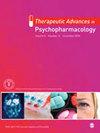Attentional bias modification and attention control training in PTSD: a systematic review and meta-analysis
IF 4
3区 医学
Q2 PHARMACOLOGY & PHARMACY
引用次数: 0
Abstract
Background:Cognitive models of post-traumatic stress disorder (PTSD) highlighted the effect of maladaptive cognitive processing in the development and maintenance of PTSD. PTSD is related to attentional bias (AB) toward threatening stimuli and greater attentional bias variability (ABV). Attentional bias modification (ABM) and attention control training (ACT) have demonstrated the effect of improving PTSD, but the results of randomized controlled trials (RCTs) are controversial.Objectives:The current study aimed to evaluate the extent of evidence supporting the efficacy of ABM in the treatment of PTSD.Design:Systematic review and meta-analysis.Methods:We searched PUBMED, PsycINFO, EMBASE, ClinicalTrials.gov, and the Cochrane Central Register of Controlled Trials for articles published between 1980 and 2022. RCTs of ABM for adult participants with PTSD symptoms were identified. The primary outcome was changes in PTSD severity, and the second outcome was changes in AB and ABV. Trial quality was assessed using the Cochrane Risk of Bias Tool. Publication bias was assessed using the Doi plot and Luis Furuya-Kanamori (LFK) index.Results:Eight RCTs comparing the effect of ABM to ACT were included in the review, and six studies were meta-analyzed. Meta-analysis favored ACT in improving PTSD symptoms and ABV, and the effect size was large. ABM and ACT demonstrated similar effects in improving AB.Conclusion:ACT should not only be seen as a control training condition but also has therapeutic values. However, since the current meta-analysis only included a limited number of studies, further research was still needed to examine the clinical value of ACT in PTSD treatment.创伤后应激障碍中的注意偏差修正和注意控制训练:系统回顾和荟萃分析
背景:创伤后应激障碍(PTSD)的认知模型强调了不良认知加工在创伤后应激障碍的发展和维持中的作用。创伤后应激障碍与对威胁性刺激的注意偏差(AB)和更大的注意偏差变异性(ABV)有关。注意偏差修正(ABM)和注意控制训练(ACT)已证明具有改善创伤后应激障碍的效果,但随机对照试验(RCT)的结果却存在争议。方法:我们检索了 PUBMED、PsycINFO、EMBASE、ClinicalTrials.gov 和 Cochrane Central Register of Controlled Trials 在 1980 年至 2022 年间发表的文章。确定了针对有创伤后应激障碍症状的成年参与者的 ABM RCT。主要结果是创伤后应激障碍严重程度的变化,次要结果是 AB 和 ABV 的变化。试验质量采用 Cochrane 偏倚风险工具进行评估。结果:8 项比较 ABM 与 ACT 效果的研究被纳入综述,6 项研究进行了元分析。荟萃分析结果表明,ACT在改善创伤后应激障碍症状和ABV方面更胜一筹,且效果显著。结论:ACT 不应仅被视为一种对照训练条件,它还具有治疗价值。然而,由于目前的荟萃分析只包含了数量有限的研究,因此仍需进一步研究ACT在创伤后应激障碍治疗中的临床价值。
本文章由计算机程序翻译,如有差异,请以英文原文为准。
求助全文
约1分钟内获得全文
求助全文
来源期刊
CiteScore
7.90
自引率
2.40%
发文量
35
审稿时长
10 weeks
期刊介绍:
Therapeutic Advances in Psychopharmacology delivers the highest quality peer-reviewed articles, reviews, and scholarly comment on pioneering efforts and innovative studies across all areas of psychopharmacology. The journal has a strong clinical and pharmacological focus and is aimed at clinicians and researchers in psychopharmacology, providing a forum in print and online for publishing the highest quality articles in this area.

 求助内容:
求助内容: 应助结果提醒方式:
应助结果提醒方式:


